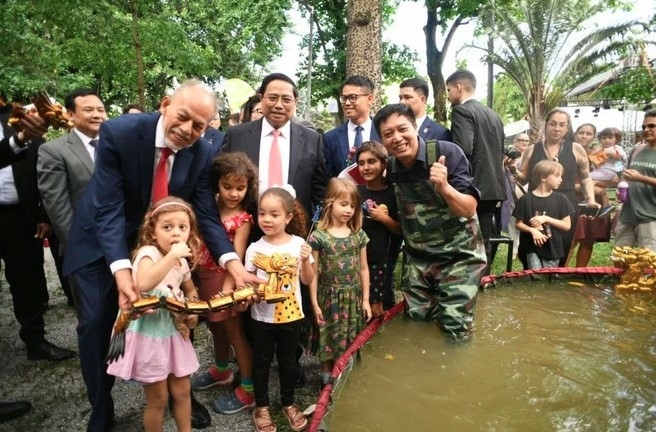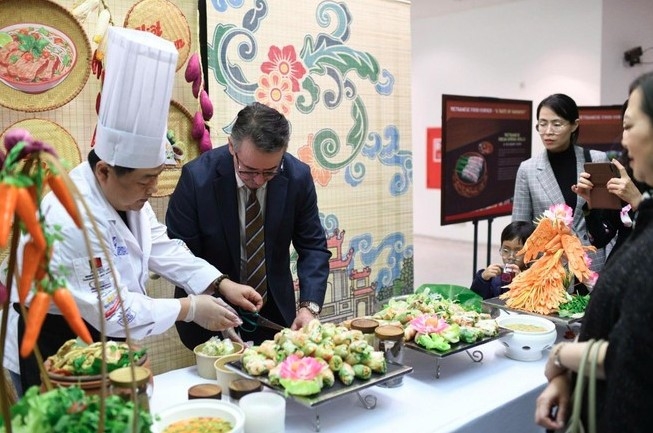Raising Vietnam’s value through cultural diplomacy
Culture - Ngày đăng : 13:36, 26/12/2024

Children in Brazil eagerly explored Vietnam’s unique art of water puppetry, while people in Saudi Arabia immersed themselves in a vibrant tropical cultural oasis amidst the desert landscape.
Young participants crafted traditional Vietnamese “to he” figurines, marveling as artisans shaped desert-themed creations like camels. These vivid moments highlight the power of cultural diplomacy - a bridge that promotes Vietnam’s culture and people globally while embracing the world’s cultural richness.
International experts commend Vietnam’s achievements in cultural diplomacy, describing it as a pivotal “soft power strategy” that enhances its standing on the global stage.
Vietnam’s active role in UNESCO’s key governance mechanisms, including its Vice Presidency of the UNESCO General Conference (since November 2023) and the General Assembly of the State Parties to the 2003 Convention for the Safeguarding of the Intangible Cultural Heritage (since June 2024), further underscores this.

Talking to the Vietnam News Agency (VNA) correspondents in Paris, UNESCO Deputy Director-General Xing Qu hailed Vietnam as a model for its cooperation with UNESCO and as an active member with marked contributions to the organisation’s affairs.
Vietnam’s cultural diplomacy strategy has already surpassed its ambitious target of achieving 60 UNESCO titles by 2030, reaching 67 as of now. In 2024 alone, the country secured notable recognitions like Ho Chi Minh City and Son La joining the Global Network of Learning Cities in February, the Nine Dynastic Urns at the Hue Imperial Citadel in the central province of Thua Thien-Hue inscribed in the Memory of the World Register in May, and the Ba Chua Xu festival on Nui Sam (Sam Mountain) in the Mekong Delta province of An Giang recognised as Intangible Cultural Heritage of Humanity in December.
Such initiatives as Vietnam Week/Days abroad have amplified the Southeast Asian nation’s image worldwide, strengthening political trust among international partners and enhancing its brand.
Vietnamese culture captivates global audiences, paving the way for cooperation, tourism growth, and sustainable economic benefits. Vietnam’s tourism sector has flourished in 2024, with 17.5 million international visitors, a 38.9% year-on-year increase. The country earned accolades such as “Asia’s Leading Destination,” “Asia’s Leading Heritage Destination,” and “Asia’s Leading Nature Destination” at the World Travel Awards for Asia and Oceania.
According to the Lowy Institute Asia Power Index 2024 (Australia), Vietnam gained 1.2 points in its overall power relative to 2023.
“Vietnam exerts more influence in the region than expected given its available resources, as indicated by the country’s positive power gap score, which remained steady in 2024”.
In 2024, Vietnam had the greatest gains in diplomatic influence (+3.3), and it improved in cultural influence (+1.9).
Nguyen Viet Ha, executive director of the Vietnam Australia Cultural Exchange Organisation (VACEO), called culture a sharp tool in Vietnam’s strategy and international relations. She said as Vietnamese culture touches global hearts, it elevates the nation’s stature.
Cultural exchanges help enhance friendship and understanding between Vietnam and other nations. In Italy, Vietnamese elements enriched New Year celebrations, highlighted by Vietnamese-language renditions of Puccini’s classics performed by opera singer Maria Ielli in Bologna.
Ling Dequan, a researcher on Vietnam affairs, highlighted 2024 as a very marvelous year for Vietnam with many important events in an interview granted to VNA correspondents in Beijing, China.
Vietnam’s cultural diplomacy has evolved alongside the growth of political diplomacy, economic diplomacy, and people-to-people diplomacy. It has been elevated in tandem with the country’s comprehensive national strength and the enhancement of its soft power, he said.
President of the Italy - Vietnam Cultural Bridge Association Le Thi Bich Huong, who is also a Vietnamese language lecturer at Ca' Foscari University of Venice, told VNA correspondents in Rome that the Vietnamese language is now taught as part of the university’s undergraduate programme, elevating Vietnam’s standing compared to other Asian countries whose languages lack such recognition.
Starting next February, the language will also be offered at the University of Turin, she said.
